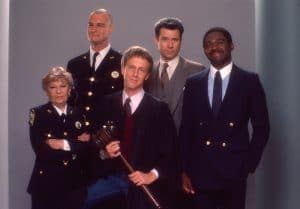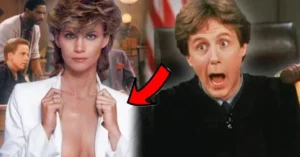
All rise for the honorable nostalgia, made most potent revisiting some TV classics. Today’s case centers around Night Court, a late ‘80s glimpse into the antics of Harry Stone’s municipal courthouse, complete with a band of colorful characters to delivery maximum mayhem.
The evidence is in, so let’s figure out all the hidden secrets of Night Court. What secrets does Bailiff Bull hide under that shining scalp of his? Just how did they choose what topics to tackle – or not – in this legal series? There are plenty of clues to paint a surprising picture about this series, so without further ado, the court is now in session.
These are their stories
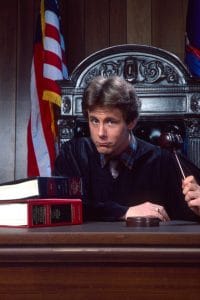
Show creator Reinhold Weege took some real inspiration for his show. In fact, he sat on the bench with some New York City night court judges. There, he saw some pretty wild things, weird enough to inspire an entire nine-season sitcom – because sometimes you just have to laugh at life. He also read about judges who were, in a word, eccentric, and ones that the state had trouble getting off the bench.
He crafted the character Judge Stone as a magician named Harry. Turns out, that exact person existed in the world! Producer Jeff Melman and his wife were watching Saturday Night Live, where none other than Harry Anderson tried performing a magic trick. They had to cast Harry, especially when they learned that Anderson even loved Mel Tormé!
Of course, friends of the staff got their shout-outs in the show, too! As prostitutes and pimps. Quite a few of the people brought into court were named after Weege’s own family and friends.
The ‘Barney Miller’ connection
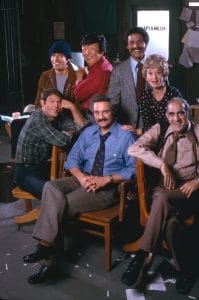
This was Weege’s second legal-based sitcom. The first was none other than Barney Miller, a comedy based on a New York police station and its memorable employees. The premise was somewhat similar and Barney Miller employed an equally colorful cast to play off of one another..
Because Weege had worked on Barney Miller, some fans of the show saw Night Court as a direct spinoff, or at the very least a spiritual successor to it. In actuality, that wasn’t supposed to be the case, but the groundwork was there. On top of the similar subject matter, the show also shared actress Florence Halop. Before playing Bailiff Florence Kleiner, Halop had been in six Barney Miller episodes.
Keeping it light
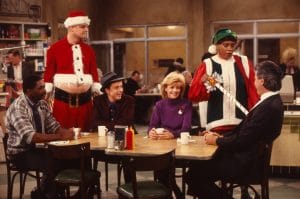
By the time Night Court aired, even sitcoms tackled heavy subjects. Diff’rent Strokes made it an artform, and even the politically incorrect Archie on All in the Family learned some lessons.
Not Night Court.
Instead, Night Court never really tried to “say” anything, and that was on purpose. In John Larroquette’s own words, quote, “We don’t make any pretense of dealing with issues that are impossible to address or solve in the sitcom format. But if you just want to forget it all for a minute and laugh at pies in the face and pants around the ankles, that’s what we do very well.”
In fact, executive producer Stu Kreisman said they were so famously politically incorrect, Night Court probably would have had a cigarette sponsor if it had aired years prior. You could always count on this show to let you just forget through laughter!
Toast to Tormé
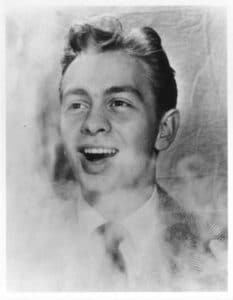
Before Night Court had an actor for its honorable judge, they knew some basic facts about him: he’d be named Harry, he’s a magic enthusiast, and his favorite singer is Mel Tormé. In fact, the first episode quickly establishes Harry’s worship of the musician. When Tormé’s own relatives saw the show, they called him up and made sure he knew about it.
Of course, Tormé was flattered by all this praise. So, when the show later asked him to appear in some episodes, he happily agreed. Turns out, they both did each other favors. All those references on Night Court made Tormé’s concert audience expand; he even said he noticed more and that younger people came to watch him perform; he directly credited the sitcom with his renewed popularity.
Selma Diamond was the Night Court’s first bailiff Selma Hacker for 36 episodes, usually accompanied by a cigarette – yes, even right in the middle of the courtroom. Hacker was in her sixties and the character’s chain-smoking let her continue her own habit. Sadly, at the age of 64, Diamond died of lung cancer.
Florence Halop then took up the mantle of Bailiff Florence Kleiner. Also in her sixties, she was chosen because her comedic timing and mannerisms were so similar to Selma’s. She stayed on for 22 episodes until she too sadly died of cancer.
These back-to-back deaths for one role sparked rumors and legends that the job was cursed. Confronted with these losses, producers decided then they’d have to hire a younger actress. Enter Marsha Warfield, in her late thirties and ready to play Roz to the show’s end. Marsha admitted to having some reservations at first, and I don’t blame her!
The Night Court held session for 193 episodes across 9 seasons, and ratings actually tended to go up as the show progressed, which is pretty ooo-kay as far as trends go! Especially given the circumstances, with a rotating cast and time slots that changed from year to year. It still managed to rack up 29 Emmy nominations!
Still, some critics could be pretty harsh, calling it bland and suggesting it robbed the cast of respect. To that, John Larroquette countered, “What is respect? You don’t do sitcoms for respect. You do them for laughs.”
So what’s the final blow against a stubborn survivor like Night Court? In-fighting and conflicting aspirations, naturally. NBC had plans to renew the show, but Warner Bros wanted to sell the show off somewhere else. So, the series ended up in a weird quasi-finished limbo, and it looked like the end was near, so the show writers treated it like the finale was fast approaching. Some original writers were even brought back to see the show through to its end. They set the groundwork for some great character arcs that would come together in a satisfying finale.
Except that finale had to be morphed into one more entire season, and all the plotlines planned for a brilliant finale had to get scrapped for this penultimate season. Writers and actors now finally felt a little slighted.
In the episode, Christine and Judge Stone finally get married, resolving the Christine-Harry-Dan love triangle. It got mixed reviews, Tina Fey gets a tip of the hat for providing a proper Night Court ending.
So, does the jury have a verdict ready? What was a great episode from Night Court? And who has a favorite character over the nine-season run? Share your thoughts in the comments below, we read every one!
